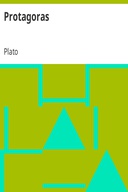Explore

In the fifth century BC professional educators, the sophists, travelled the Greek world claiming to teach success in public and private life. In this dialogue Plato shows the pretensions of the leading sophist, Protagoras, challenged by the critical arguments of Socrates. From criticism of the educational aims and methods of the sophists the dialogue broadens out to consider the nature of the good life, and the role of pleasure and intellect in the context of that life. The dialogue combines subtlety of argument with intricacy of dramatic construction and brilliant characterization. This translation achieves both precision and colloquial naturalness, while the notes and introduction set the arguments in their historical and philosophical context.
This book is included in Project Gutenberg.
Why read this book? Have your say.
You must be logged in to comment.
Rights Information
Are you the author or publisher of this work? If so, you can claim it as yours by registering as an Unglue.it rights holder.Downloads
This work has been downloaded 1329 times via unglue.it ebook links.
- 93 - epub (0.2) (PD-US) at Github.
- 140 - mobi (0.2) (PD-US) at Github.
- 101 - pdf (0.2) (PD-US) at Github.
- 148 - epub (0.2) (PD-US) at Github.
- 151 - mobi (0.2) (PD-US) at Github.
- 120 - pdf (0.2) (PD-US) at Github.
- 197 - epub (PD-US) at Github.
- 182 - mobi (PD-US) at Github.
- 197 - pdf (PD-US) at Github.
Keywords
- B
- Classical literature
- GITenberg
- PA
- Protagoras
- Socrates, 470 BC-399 BC
- Sophists (Greek philosophy)
- Virtue -- Early works to 1800
Links
web: http://www.gutenberg.org/ebooks/1591Editions

